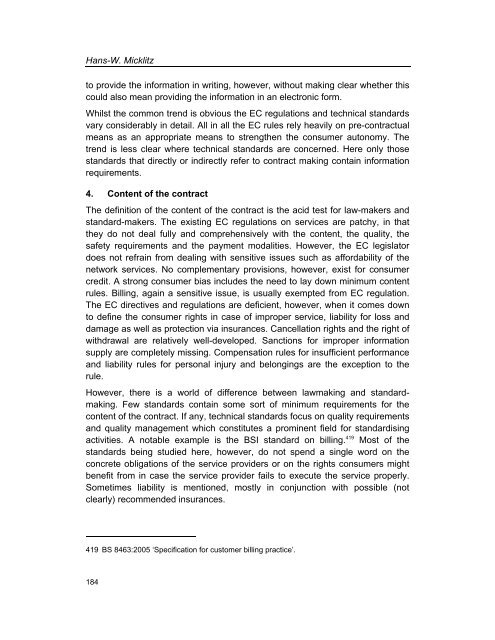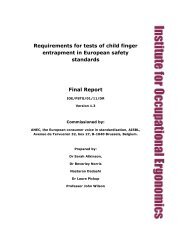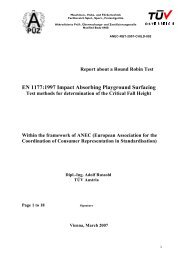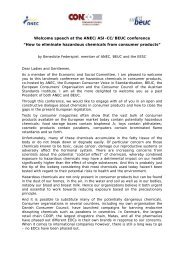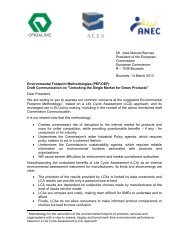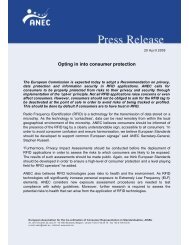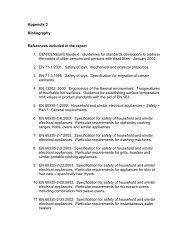Services Standards: Defining the Core Consumer Elements ... - ANEC
Services Standards: Defining the Core Consumer Elements ... - ANEC
Services Standards: Defining the Core Consumer Elements ... - ANEC
Create successful ePaper yourself
Turn your PDF publications into a flip-book with our unique Google optimized e-Paper software.
Hans-W. Micklitz<br />
to provide <strong>the</strong> information in writing, however, without making clear whe<strong>the</strong>r this<br />
could also mean providing <strong>the</strong> information in an electronic form.<br />
Whilst <strong>the</strong> common trend is obvious <strong>the</strong> EC regulations and technical standards<br />
vary considerably in detail. All in all <strong>the</strong> EC rules rely heavily on pre-contractual<br />
means as an appropriate means to streng<strong>the</strong>n <strong>the</strong> consumer autonomy. The<br />
trend is less clear where technical standards are concerned. Here only those<br />
standards that directly or indirectly refer to contract making contain information<br />
requirements.<br />
4. Content of <strong>the</strong> contract<br />
The definition of <strong>the</strong> content of <strong>the</strong> contract is <strong>the</strong> acid test for law-makers and<br />
standard-makers. The existing EC regulations on services are patchy, in that<br />
<strong>the</strong>y do not deal fully and comprehensively with <strong>the</strong> content, <strong>the</strong> quality, <strong>the</strong><br />
safety requirements and <strong>the</strong> payment modalities. However, <strong>the</strong> EC legislator<br />
does not refrain from dealing with sensitive issues such as affordability of <strong>the</strong><br />
network services. No complementary provisions, however, exist for consumer<br />
credit. A strong consumer bias includes <strong>the</strong> need to lay down minimum content<br />
rules. Billing, again a sensitive issue, is usually exempted from EC regulation.<br />
The EC directives and regulations are deficient, however, when it comes down<br />
to define <strong>the</strong> consumer rights in case of improper service, liability for loss and<br />
damage as well as protection via insurances. Cancellation rights and <strong>the</strong> right of<br />
withdrawal are relatively well-developed. Sanctions for improper information<br />
supply are completely missing. Compensation rules for insufficient performance<br />
and liability rules for personal injury and belongings are <strong>the</strong> exception to <strong>the</strong><br />
rule.<br />
However, <strong>the</strong>re is a world of difference between lawmaking and standardmaking.<br />
Few standards contain some sort of minimum requirements for <strong>the</strong><br />
content of <strong>the</strong> contract. If any, technical standards focus on quality requirements<br />
and quality management which constitutes a prominent field for standardising<br />
activities. A notable example is <strong>the</strong> BSI standard on billing. 419 Most of <strong>the</strong><br />
standards being studied here, however, do not spend a single word on <strong>the</strong><br />
concrete obligations of <strong>the</strong> service providers or on <strong>the</strong> rights consumers might<br />
benefit from in case <strong>the</strong> service provider fails to execute <strong>the</strong> service properly.<br />
Sometimes liability is mentioned, mostly in conjunction with possible (not<br />
clearly) recommended insurances.<br />
419 BS 8463:2005 ‘Specification for customer billing practice’.<br />
184


